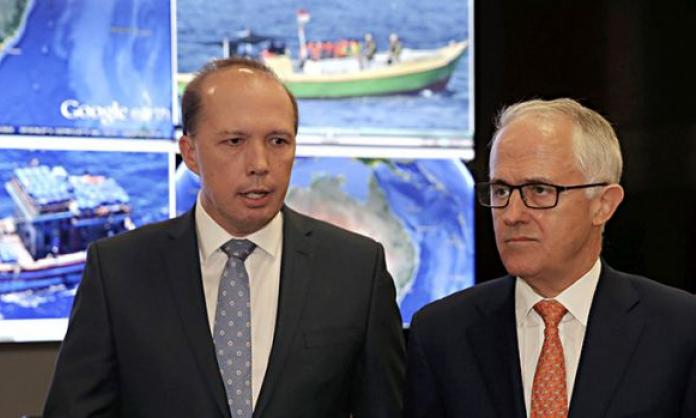The Turnbull-Obama refugee deal is an exercise in human trafficking that further cements the Australian government’s record of human rights abuses.
It is a “one-time deal” in which an unknown number of refugees in Australia’s offshore detention facilities will be eligible for resettlement in the US. The deal throws into question whether the government’s September pledge to accept refugees camped in Costa Rica, Central America, made at Barack Obama’s global migration summit in New York, was only the first part of a now expanded agreement.
The government said it will prioritise families, women and children in this process. The offer is not available to those who have accepted resettlement elsewhere or those arriving in offshore camps after 13 November. Any refugees who remain because they are rejected by the US, or who refuse to accept that the Australian government can extinguish their human rights, will face the prospect of 20-year temporary visas for Nauru.
Behrouz Boochani, Manus detainee and journalist, explained to the Guardian, “Be sure that most people would love to go to America, but some people need to join their families in Australia”. Another reason for Manus Island refugees to stay is that there is a current court case in Papua New Guinea, seeking compensation for their years of detention.
No doubt, as Boochani notes, there will be relief among many refugees that perhaps their ordeal in Australia’s gulag archipelago is finally coming to an end. The detention system is renowned for torture, murders, rapes, and assaults at the hands of security guards, which have been exposed by determined protests and riots by the detainees and numerous leaks from detention centre staff. You can understand that people who have survived this abomination would take whatever opportunity they could to get out.
But human rights advocates in Australia should see this for what it is: a continuing betrayal of the right to seek asylum. With this deal, the government and its backers are only reaffirming that Australia has no obligation under the refugee convention to grant asylum to people with a well-founded fear of persecution in their home country, and that it can engage in human trafficking.
The US deal was quickly followed by the launch of prime minister Malcolm Turnbull’s “ring-of-steel” – the largest ever maritime surveillance effort. According to the Australian, Border Force personnel were sent to Sri Lanka and India to make sure that measures to prevent people exercising their human right to seek asylum would remain in place. So the US deal will clear space in the detention centres only so that any future asylum seekers arriving by boat would again be trapped in Australia’s offshore Guantanamo. As Peter Dutton said, Nauru will remain a detention facility “forever”.
That the deal is a cynical move is also indicated by the language with which it is justified. Turnbull and Dutton continue a long tradition of the ludicrous amalgam of humanitarian and racist rhetoric. They announced to assembled journalists that the aim is to turn back boats and thus limit the “people smugglers’ marketing tool”. But they stressed that the “priority [for resettlement in the US] is very much on the most vulnerable which are family units”.
Three years of offshore processing has given Australia the reputation of international racist pariah. Last year Australia failed to establish a viable “third country” resettlement after investigating options such as Cambodia, the Philippines and Kyrgyzstan.
The offshore system became untenable in April when Papua New Guinea’s Supreme Court ruled the Manus Island detention centre illegal and unconstitutional. Yet the Australian government refused to take responsibility for the detainees and the centre remained open. In September, the government attempted to bribe detainees with $10,000 to return to their country of origin.
The ongoing failure of the government’s attempts to be as brutal as possible has now led to the US deal, which is only a temporary clearing of the camps. Not only that, the government is clearly pushing a racist agenda – the implicit notion is that Turnbull is swapping “bad” Muslim refugees for non-threatening, probably Catholic, Central American refugees.
Nick McKim from the Greens welcomed the deal as an admission indefinite offshore detention was unacceptable. He also acknowledged there were “still significant levels of uncertainty” for refugees because the number eligible and the timeframe are unspecified.
The Labor Party has responded to the deal with confused and tentative support. “We are pleased if it is an end to indefinite detention”, Shorten said. Labor frontbencher Anthony Albanese said a deal would be a good thing. “We do want to see people moved out of these facilities.”
More critical statements have come from the ASRC’s Kon Karapanagiotidis, who tweeted: “That Australia is willing to take refugees from Costa Rica but not those we are responsible for shows that this is all about politics not people”. The director of the Human Rights Law Centre, Daniel Webb said in a media release, “Showing decency to one person seeking asylum doesn’t justify or require cruelty to another”.
Refugee supporters in Australia should be clear that the US deal is an escalation of refugee-politicking. After 24 years of deteriorating treatment of refugees, we should maintain our demands for an end to mandatory detention, not cave at a deal that only gives the appearance of change. Anything less than letting the refugees into Australia is unacceptable.
We should take inspiration from Behrouz Boochani who spoke to the Guardian, “I prefer to be in prison than leave this island without my friends, because I cannot accept injustice … I’m not a slave that they use for their political aims. It’s time we show people what humanity is and what human rights are”.








